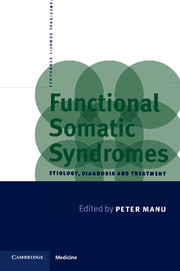Book contents
- Frontmatter
- Contents
- List of contributors
- Preface
- 1 Definition and Etiological Theories
- 2 Chronic Fatigue Syndrome
- 3 Fibromyalgia Syndrome
- 4 Irritable Bowel Syndrome
- 5 Premenstrual Syndrome
- 6 Interstitial Cystitis
- 7 Temporomandibular Disorders
- 8 Chest Pain Syndromes
- 9 Repetitive Strain Injury
- 10 Multiple Chemical Sensitivities
- 11 Psychopharmacology of Functional Somatic Syndromes
- 12 Psychotherapy of Functional Somatic Syndromes
- 13 Determination Of Disability Claimed By Patients With Functional Somatic Syndromes
- 14 Functional Somatic Syndromes: Exploring Common Denominators
- Index
4 - Irritable Bowel Syndrome
Published online by Cambridge University Press: 08 January 2010
- Frontmatter
- Contents
- List of contributors
- Preface
- 1 Definition and Etiological Theories
- 2 Chronic Fatigue Syndrome
- 3 Fibromyalgia Syndrome
- 4 Irritable Bowel Syndrome
- 5 Premenstrual Syndrome
- 6 Interstitial Cystitis
- 7 Temporomandibular Disorders
- 8 Chest Pain Syndromes
- 9 Repetitive Strain Injury
- 10 Multiple Chemical Sensitivities
- 11 Psychopharmacology of Functional Somatic Syndromes
- 12 Psychotherapy of Functional Somatic Syndromes
- 13 Determination Of Disability Claimed By Patients With Functional Somatic Syndromes
- 14 Functional Somatic Syndromes: Exploring Common Denominators
- Index
Summary
The functional gastrointestinal disorders, defined as a ‘variable combination of chronic or recurrent gastrointestinal symptoms not explained by structural or biochemical abnormalities,’ are categorized according to the part of the gastrointestinal tract to which the symptoms are attributed (Drossman et al., 1990, 1993). They are a common cause of patient visits to primary physicians and various specialists and result in high direct medical costs and indirect costs, such as work absenteeism. The irritable bowel syndrome (IBS) is the prototypic functional bowel disorder in terms of its heterogeneous nature, multifactorial pathogenesis and requirement for individualized diagnosis and treatment.
History
The concepts of IBS and its postulated pathogenesis have evolved since the earliest published descriptions of a disorder compatible with it in the nineteenth century (Drossman, 1994; Schuster, 1994). Initially, excessive colonic mucus production was emphasized as characteristic of IBS, giving rise to the name ‘mucus colitis’. The early recognition of associated psychological factors was exemplified by Osler's emphasis on the patients' ‘hysterical, hypochondriacal and neurasthenic personalities’, characteristics which would now be applied to few IBS patients. Subsequent psychosomatic explanations of the disorder invoked psychoanalytical theory and biological predisposition. In the 1920s, IBS was described as a nervous response to stress, with emphasis on the etiological importance of colonic spasm, which was attributed to autonomic nerve dysfunction. Almy and others later showed that colonic contractions were increased by physical and psychological stress (Almy & Tulin, 1947; Deller & Wangel, 1965).
Keywords
- Type
- Chapter
- Information
- Functional Somatic SyndromesEtiology, Diagnosis and Treatment, pp. 58 - 79Publisher: Cambridge University PressPrint publication year: 1998

